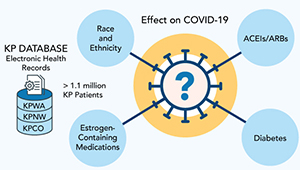Susan Shortreed, PhD
Biography
Susan Shortreed, PhD, uses statistics and machine learning methods to address health science problems, with a special emphasis on analyzing complex longitudinal data. She develops and evaluates statistical approaches for observational data, and works to improve the design and analyses of studies that use data collected from electronic health care records. She is leading a project to develop statistical methods for constructing personalized treatment strategies using data captured from electronic health records.
Dr. Shortreed earned her PhD in statistics from the University of Washington. Then she spent two years in the Department of Epidemiology and Preventive Medicine at Monash University in Melbourne, Australia, and two years in the School of Computer Science at McGill University in Montreal, Canada. Dr. Shortreed has collaborated with scientists in a broad range of areas including alcohol use, cancer screening, and medication safety. She now works alongside researchers in mental and behavioral health, evaluating and comparing treatments for chronic pain and depression, and interventions to prevent suicide. Dr. Shortreed is an investigator with the Mental Health Research Network, designing studies to address important public health concerns, such as determining which antidepressant medications work best for which patients and developing risk prediction algorithms to identify individuals who may be at increased risk for suicidal behavior.
Dr. Shortreed is also an affiliate professor of biostatistics at the University of Washington School of Public Health. She served on the executive board for the American Statistical Association’s Section on Statistics in Epidemiology and the editorial board of the Journal of the Royal Statistical Society, Series C: Applied Statistics.
Research interests and experience
-
Biostatistics
Design and analysis of studies that use data collected from electronic health records; analysis of complex longitudinal data; methods for constructing personalized treatment strategies, computational statistics and algorithms; machine learning; variable selection methods.
Medication Use & Patient Safety
Biostatistics; machine learning; using data collected from electronic health records to study rare adverse events; opioid safety; medication safety in pregnancy.
-
Mental Health
Biostatistics; treatment for chronic depression; suicide prevention; developing personalized treatment strategies; developing risk prediction models.
Recent publications
Dublin S, Walker RL, Floyd JS, Shortreed SM, Fuller S, Albertson-Junkans L, Harrington LB, Greenwood-Hickman MA, Green BB, Psaty BM Renin-angiotensin-aldosterone system inhibitors and COVID-19 infection or hospitalization: a cohort study 2021 Apr 20;34(4):339-347. doi: 10.1093/ajh/hpaa168. PubMed
Richards JE, Shortreed SM, Simon GE, Penfold RB, Glass JE, Ziebell R, Williams EC Association Between Patterns of Alcohol Use and Short-Term Risk of Suicide Attempt Among Patients With and Without Reported Suicidal Ideation 2020 Sep;14(5):e160-e169. doi: 10.1097/ADM.0000000000000637. PubMed
Shortreed SM, Simon GE Using predictive analytics to improve pragmatic trial design 2020 Aug;17(4):394-401. doi: 10.1177/1740774520910367. Epub 2020-03-10. PubMed
Shortreed SM, Moodie EEM Automated analyses: Because we can, does it mean we should? 2020 Aug;35(3):499-502. doi: 10.1214/20-sts773. Epub 2020-09-11. PubMed
Dublin S, Walker RL, Floyd JS, Shortreed SM, Fuller S, Albertson-Junkans LH, Harrington LB, Greenwood-Hickman MA, Green BB, Psaty BM Renin-angiotensin-aldosterone system inhibitors and COVID-19 infection or hospitalization: a cohort study 2020 Jul 7 doi: 10.1101/2020.07.06.20120386. PubMed
Zheng Y, Corley DA, Doubeni C, Halm E, Shortreed SM, Barlow WE, Zauber A, Tosteson TD, Chubak J ANALYSES OF PREVENTIVE CARE MEASURES WITH INCOMPLETE HISTORICAL DATA IN ELECTRONIC MEDICAL RECORDS: AN EXAMPLE FROM COLORECTAL CANCER SCREENING 2020 Jun;14(2):1030-1044. doi: 10.1214/20-aoas1342. Epub 2020-06-29. PubMed
Carrell DS, Albertson-Junkans L, Ramaprasan A, Scull G, Mackwood M, Johnson E, Cronkite DJ, Baer A, Hansen K, Green CA, Hazlehurst BL, Janoff SL, Coplan PM, DeVeaugh-Geiss A, Grijalva CG, Liang C, Enger CL, Lange J, Shortreed SM, Von Korff M Measuring problem prescription opioid use among patients receiving long-term opioid analgesic treatment: development and evaluation of an algorithm for use in EHR and claims data 2020 Jan;9(1):97-105. doi: 10.1080/21556660.2020.1750419. Epub 2020-04-28. PubMed
Chen L, Shortreed SM, Easterling T, Cheetham TC, Reynolds K, Avalos LA, Kamineni A, Holt V, Neugebauer R, Akosile M, Nance N, Bider-Canfield Z, Walker RL, Badon SE, Dublin S Identifying hypertension in pregnancy using electronic medical records: The importance of blood pressure values 2020 Jan;19:112-118. doi: 10.1016/j.preghy.2020.01.001. Epub 2020-01-03. PubMed
Richards JE, Shortreed SM, Simon GE, Penfold RB, Glass JE, Ziebell R, Williams EC Short-term risk of suicide attempt associated with patterns of patient-reported alcohol use determined by routine AUDIT-C among adults receiving mental healthcare 2020 Jan;62:79-86. doi: 10.1016/j.genhosppsych.2019.12.002. Epub 2019-12-18. PubMed
Simon GE, Shortreed SM, Rossom RC, Penfold RB, Sperl-Hillen JAM, O'Connor P Principles and procedures for data and safety monitoring in pragmatic clinical trials 2019 Dec 9;20(1):690. doi: 10.1186/s13063-019-3869-3. Epub 2019-12-09. PubMed
Research

COVID risks not meaningfully greater with estrogen-containing medications
Oral contraceptives, hormone therapy not linked to more severe COVID outcomes.
Research

A medication that can relieve symptoms of psychosis is underused
Study finds that many patients who might benefit from clozapine don’t receive it.
Research

New findings on treating hypertension in pregnancy
A study led by Dr. Sascha Dublin finds similar outcomes for 3 hypertension medications, filling an evidence gap.
COVID-19

Greater infection risks linked to COVID-19 disparities
New work by Susan Shortreed, PhD, finds infection risks drive worse outcomes for some racial and ethnic groups.
Drugs, diabetes, disparities

Studying COVID-19 risk and outcomes
Dr. Sascha Dublin tells how studies of KP electronic health record data can improve COVID-19 treatment and prevention.
KPWHRI IN THE MEDIA
Simpler models for predicting suicide risk work comparably to more complex ones
Q&A: Simple machine learning model predicts suicide risk well
Healio Psychiatry, April 12, 2023



